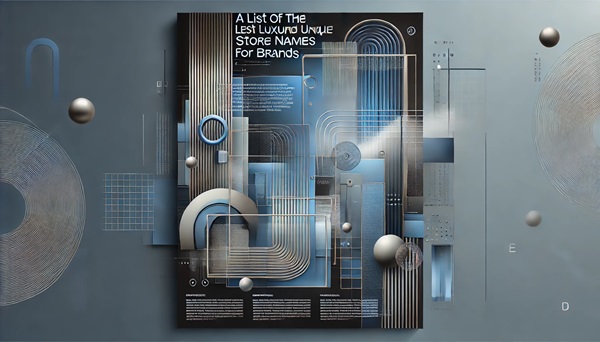In the fast-paced world of e-commerce, having a memorable and impactful store name can make all the difference. A store name is more than just a label—it's the identity that reflects the essence of your brand and its values. This is especially true for luxury and unique brands, where the right name can evoke exclusivity, prestige, and creativity. In this detailed guide, we will explore how to craft and select the best luxury and unique store names for your brand, providing a list of strategic steps, examples, and case studies to help you stand out in a competitive market.
we will also highlight the powerful e-commerce management systems offered by Linkysoft that can help your luxury or unique brand thrive online. With over 5000 words of insights, this guide ensures you have all the knowledge you need to make informed decisions about your brand’s name and its online presence.

1. The Role of a Store Name in Building a Luxury Brand
For luxury brands, the store name plays an integral role in setting the tone for what the brand represents. In e-commerce, a well-thought-out store name is often the first interaction potential customers have with your business, making it crucial to get it right.
What Makes a Name "Luxury"?
Luxury names are more than just words—they carry a weight of exclusivity, elegance, and a promise of high-quality products or services. These names often evoke strong emotional responses and reflect the brand’s core values. The best luxury store names are simple yet sophisticated, and they often incorporate elements such as:
- Historical or cultural references
- Use of founder names or family legacies
- Unique language, often derived from French, Italian, or Latin origins
- Symbolic meaning, representing something greater than the product itself
Examples of Luxury Store Names
Consider names like Rolex, Cartier, and Bentley. These names are not only easy to remember but also carry deep associations with luxury, quality, and craftsmanship. Each name represents decades of tradition and exclusivity, making them globally recognizable as luxury symbols.
Case Study: The Rise of Bentley
Bentley Motors was founded in 1919 by W.O. Bentley, who set out to build "a fast car, a good car, the best in its class." The Bentley name has since become synonymous with luxury and performance, partly due to the prestige associated with the founder’s family name. Bentley's careful management of its brand and consistent delivery of high-quality products has solidified its place as a leader in the luxury automobile industry.
2. Characteristics of Successful Luxury Store Names
A luxury brand name must do more than simply sound exclusive—it needs to communicate the brand's identity clearly and resonate with the right audience. To achieve this, there are several key characteristics that successful luxury store names share.
Elegance and Minimalism
Many luxury brands opt for elegant and minimalist names. These names are often one or two words, making them easy to remember. The simplicity of the name often reflects the streamlined experience and high-quality service that luxury brands aim to provide.
Historical or Cultural Significance
Some of the best luxury names incorporate historical or cultural elements. Brands like Ferrari and Bulgari use names that connect them to a rich heritage, often rooted in their country of origin, which adds an air of authenticity and tradition to their offerings.
How Bulgari Used Cultural Roots to Enhance Their Brand
Bulgari, founded by Sotirios Voulgaris in Rome, has strong Greek and Italian influences in its brand. The name "Bulgari" is derived from the founder’s surname, and the brand has built its reputation on blending Greek classicism with Roman tradition, creating a unique identity in the world of luxury goods.
3. Creating Unique Store Names for Emerging Brands
While luxury brands often rely on tradition, emerging brands can set themselves apart by choosing store names that are unique and modern. Unique names should be creative, memorable, and not easily confused with existing brands.
How to Generate Unique Store Names
Creating a unique store name requires a balance between creativity and strategy. The name should not only be distinct but also resonate with your brand’s values and appeal to your target audience. Some strategies to generate unique names include:
- Word Play: Combining two or more words to create a fresh, new name, like “Net-a-Porter” or “Lush.”
- Invented Words: Creating entirely new words, as seen with names like “Google” or “Zappos.”
- Symbolism: Using symbolic names that represent an idea or concept, such as “Everlane” for sustainable fashion.
Best Practices for Ensuring a Name is Unique
Once you have a potential name in mind, it's essential to conduct thorough research to ensure it hasn’t been taken. Check domain availability, conduct trademark searches, and review existing brands to avoid legal complications and brand confusion.
Case Study: The Birth of "Glossier"
Glossier is a beauty brand that built its identity around minimalist, user-friendly products. The name “Glossier” cleverly plays on the idea of "gloss," a key product in the beauty industry, while adding a unique twist by incorporating French spelling, which evokes a sense of sophistication and luxury.
4. How E-commerce Management Systems Enhance Brand Identity
The success of a luxury or unique store doesn’t rest solely on the name. In the digital age, managing an online store efficiently is crucial to delivering the exclusive, seamless experience expected of luxury brands. Linkysoft provides comprehensive e-commerce management systems that cater to the unique needs of luxury and emerging brands.
Linkysoft E-commerce Systems
Linkysoft offers several powerful tools designed to help brands streamline operations and enhance their online presence:
- Cartz - E-commerce Management System: A versatile solution for managing products, orders, and customer relationships.
- Togar - Multi-vendor or Single Vendor E-commerce Management System: Ideal for brands managing multiple vendors or operating a marketplace.
- Togar Pro: An advanced version of Togar, providing additional tools for scaling and enhancing brand performance.
The Role of E-commerce Systems in Supporting Brand Image
A high-functioning e-commerce system helps maintain a luxury brand’s reputation by ensuring a seamless customer experience. From personalized marketing to efficient inventory management, e-commerce platforms like Linkysoft’s solutions enable brands to focus on maintaining their premium identity.
Example: How Linkysoft Supported a Luxury Fashion Brand’s Growth
One luxury fashion brand implemented Linkysoft’s Togar Pro system to manage their expanding online presence. The system enabled the brand to integrate personalized shopping experiences, efficiently manage multiple vendors, and scale their operations without compromising on quality, ultimately reinforcing their image as a top-tier luxury brand.
5. Naming Trends in the Luxury Industry
Like all industries, the luxury sector sees shifts in naming conventions as trends evolve. In recent years, there has been a move towards modern, minimalist names that are easier to pronounce and more approachable, yet still maintain the air of exclusivity expected from luxury brands.
Modern Minimalism in Luxury Naming
Minimalist names have become increasingly popular as they offer a sleek, contemporary feel while remaining versatile across global markets. Brands like Celine and Acne Studios exemplify this trend with their short, punchy names that are simple yet sophisticated.
Examples of Minimalist Names in Luxury
Case Study: Valentino's Reinvention
Valentino has long been a name associated with luxury, but recent brand reinvention has focused on simplifying the brand’s image while maintaining its opulence. By using minimalist marketing and product design, the brand appeals to both traditional luxury consumers and modern, younger audiences.
6. Choosing a Name That Resonates Globally
In today’s interconnected world, brands must consider how their store names will resonate with a global audience. A luxury store name should transcend borders, cultures, and languages while maintaining its core identity.
Universal Appeal vs. Local Relevance
Finding the right balance between universal appeal and local relevance can be challenging. Some brands choose to stick with simple, easily translatable names, while others adapt their names to suit local markets.
Case Study: How LVMH Built a Global Luxury Empire
The LVMH group, which owns brands such as Louis Vuitton and Fendi, has mastered the art of balancing global recognition with local market adaptation. Their names are globally recognized and resonate with luxury consumers worldwide, while their marketing strategies are adapted to suit different cultural preferences.
7. The Legal Aspects of Naming Your Store
Before settling on a luxury or unique store name, it’s essential to consider the legal implications. Trademark infringement or failure to secure your store name could result in costly legal battles or rebranding efforts down the line.
Trademarking Your Brand Name
Registering a trademark for your store name provides legal protection and ensures that competitors cannot use a similar name. It also helps solidify your brand's uniqueness in the marketplace.
How to Trademark a Store Name
The process of trademarking involves conducting a thorough search to ensure your name is not already in use, followed by filing an application with the appropriate intellectual property office. It’s recommended to consult with a legal expert specializing in trademarks to avoid potential issues.
Examples of Successfully Trademarked Luxury Brand Names
Brands like Dior and Gucci have long-standing trademarks that protect their brand identity globally, preventing others from capitalizing on their established names and reputations.
8. Testing Your Store Name: A Key Step Before Launch
Before officially launching your luxury or unique store name, it's essential to test how it resonates with your target audience. This can be done through market research, customer surveys, or A/B testing different name options.
Importance of Audience Feedback
Your store name needs to connect with your target audience on an emotional level. Testing can help you gather insights into how potential customers perceive your brand name, whether it evokes the desired emotions, and how memorable it is.
Testing Techniques for Luxury Brands
- Focus groups to gather direct feedback from your target market
- Online surveys to reach a broader audience and collect quantitative data
- A/B testing to compare different name options and see which performs better
Example of Name Testing in Action
Before launching, one high-end jewelry brand tested two names—one traditional and one modern—among a select group of customers. After gathering feedback, the brand chose the more modern name, which better reflected their target market’s preferences and allowed them to stand out in a competitive space.
9. Conclusion: Building a Lasting Legacy with the Right Store Name
Crafting the best luxury and unique store name for your brand requires a balance of creativity, strategy, and insight. Whether you’re looking to evoke a sense of heritage, stand out with a modern twist, or appeal to a global audience, the right name can become synonymous with success.
Beyond the name, managing your store with efficient e-commerce systems like Cartz or Togar Pro ensures your brand maintains its luxury or unique identity in the digital marketplace.
With the right tools and strategies in place, your luxury or unique store name will not only resonate with your audience but also help you build a lasting legacy in the world of e-commerce.








